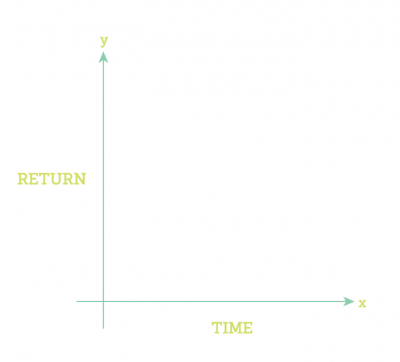…and why it is probably the most important element
Is time in trading important? If it matters, then why nobody talks about it?
What are the most important elements of trading? Capital, Trading System, Money Management, Black Swans, Luck? If you imagine trading on an XY axes, what would be your “X” and what would be your “Y”?
It is really hard to imagine trading separated from time. For a lot of you this might sound esoteric, but the long and the short of it are that time is essential. For some traders, it could be important because they have incorporated time as part of their trading strategy. For example, they only close a position after a certain “X” number of days. For other traders, time equals trading opportunities. Scalpers will understand what I mean. For a third type of traders, time gives them a better horizon to maximise their profits. As Jesse Livermore has put it- cut losers fast and let winners run. You can clearly see from this quote that time is all it matters. So why is this crucial element of trading so unrepresented? Why nobody talks about it?
To make this article more interactive, I have asked a group of traders of what they think of time. Some of the traders did not even understood the question (as expected), but three traders understood me perfectly well and their answers stood out. Here, I am going to share them with you. I have decided to keep their names anonymous, but still wanted to credit their work. Here are the answers that struck me most with their ingenuity:
Trader 1:
Time is called theta. It’s really important especially when/if you are trading options. If your going to sit in something you want it to move. The work you put in to a position and all that it entails to carry is not worth it if you just sit in it burning theta.
Trader 2:
Absolutely time matters. Any and all statistical analysis for time-series data of financial instruments depends on the time-constant for the X axis. Without it you would just have a bunch Ys, and what kind of statistical relevance would that provide; there would be no such thing as charts, trends, or “black swan events”… Whether traders realize it or not – time is the most important factor because without it there would be no context for price movement.
Trader 3:
The role of time in the markets and price movement is one of my favourite topics to think about lately! There’s not much opportunity to discuss it though, so my thoughts are fairly unorganized.
I think that the key paradox of time is that you can not understand how the market operates without considering the time factor. At the same time, you can be a successful trader without paying any attention to time at all.
Consider Point & Figure charts, and Renko charts. Both time honoured approaches that remove time from the analysis completely.
More commonly though, are all of the traders who enter based on a particular price level, hope that price will move to their target level, somehow, and at some time, without really factoring in time considerations, save for events (eg the weekend, NFP). That’s not a criticism, if anything it may be a strength, by reducing the number of variables that need to be considered.
Other people deal with the time issue more obliquely. Consider the DOM trader who is trying to run the big money orders. Their “time decision” (i.e. when do I enter), is largely solved in an instant.
Most people will not want to hold a trade ‘too long’ but often the need for patience (a time related attribute) is the dominant song.
When you think about it though, there aren’t many common tools for dealing with the time aspect: when to enter, how long price should take to move, how long to wait for it, when to exit. Gann cycles and Fib time intervals are esoteric, and possibly useless. Elliott Wave Theory postulates that price action should unfold over time in a certain way, but makes no quantifications.
Yet despite all this, when you start looking at the market as a reflection of the real world, it’s very hard to escape time. The open of each trading session inspires periodic injections of liquidity and activity. These sessions even influence which pairs are more active. Also many major players have specific time constraints on how they operate – you can’t sit on client orders forever, you have to get them filled! We know that people use charts that are divided into arbitrary periods, and that they are likely to take action as these periods turn over, and less frequently in between. Known is the fact that the spot market interacts with time-based derivatives (options). More importantly, we know that major action can begin from well traversed price areas. But there’s something that promotes a breakout this time. Time is intensely interwoven into the basic structure of the market, yet it’s hard to really pin down how to work with it from a trading point of view, other than working with known key time points (opens, closes, news releases).
CONCLUSION- Does really time matter
As a matter of fact- yes! No matter how underestimated or badly expressed it is, time continues to be a leading factor in trading. Without time trading cannot exist. The reason why this crucial factor is so underrepresented in the literature still eludes my mind. Maybe there will a brand new trading strategy purely based on time.
One way or another, time is taking a great place in our trading with or without our realisation. That is one of the main reasons why I have decided to create this article. Time takes a central role in price action trading and that is one of the major reasons why I trade with New York Close charts.
This material is written for educational purposes only. By no means do any of its contents recommend, advocate or urge the buying, selling or holding of any financial instrument whatsoever. Trading and Investing involves high levels of risk. The author expresses personal opinions and will not assume any responsibility whatsoever for the actions of the reader. The author may or may not have positions in Financial Instruments discussed in this newsletter. Future results can be dramatically different from the opinions expressed herein. Past performance does not guarantee future results.
Editors’ Picks

EUR/USD holds firm above 1.1900 as US NFP looms
EUR/USD holds its upbeat momentum above 1.1900 in the European trading hours on Wednesday, helped by a broadly weaker US Dollar. Markets could turn cautious later in the day as the delayed US employment report for January will takes center stage.

USD/JPY remains heavy around 153.00 on firmer Japanese Yen
USD/JPY is sustaining its three-day rout at around 153.00 in the European session on Wednesday, awaiting the closely-watched US NFP report. Rising bets on Fed rate cuts keep the US Dollar depressed. In contrast, expectations that PM Takaichi's policies will boost the economy and allow the BoJ to stick to its hawkish stance bolster the Japanese Yen, weighing on the pair amid intervention fears.

Gold sticks to gains near $5,050 as focus shifts to US NFP
Gold holds moderate gains near the $5,050 level in the European session on Wednesday, reversing a part of the previous day's modest losses amid dovish US Federal Reserve-inspired US Dollar weakness. This, in turn, is seen as a key factor acting as a tailwind for the non-yielding yellow metal ahead of the critical US NFP release.

US Nonfarm Payrolls expected to show modest job gains in January
The United States Bureau of Labor Statistics will release the delayed Nonfarm Payrolls data for January on Wednesday at 13:30 GMT. Investors expect NFP to rise by 70K following the 50K increase recorded in December.

S&P 500 at 7,000 is a valuation test, not a liquidity problem
The rebound from last week’s drawdown never quite shook the sense that it was being supported by borrowed conviction. The S&P 500 once again tested near the 7,000 level (6,986 as the high watermark) and failed, despite a macro backdrop that would normally be interpreted as supportive of risk.
RECOMMENDED LESSONS
Making money in forex is easy if you know how the bankers trade!
I’m often mystified in my educational forex articles why so many traders struggle to make consistent money out of forex trading. The answer has more to do with what they don’t know than what they do know. After working in investment banks for 20 years many of which were as a Chief trader its second knowledge how to extract cash out of the market.
5 Forex News Events You Need To Know
In the fast moving world of currency markets where huge moves can seemingly come from nowhere, it is extremely important for new traders to learn about the various economic indicators and forex news events and releases that shape the markets. Indeed, quickly getting a handle on which data to look out for, what it means, and how to trade it can see new traders quickly become far more profitable and sets up the road to long term success.
Top 10 Chart Patterns Every Trader Should Know
Chart patterns are one of the most effective trading tools for a trader. They are pure price-action, and form on the basis of underlying buying and selling pressure. Chart patterns have a proven track-record, and traders use them to identify continuation or reversal signals, to open positions and identify price targets.
7 Ways to Avoid Forex Scams
The forex industry is recently seeing more and more scams. Here are 7 ways to avoid losing your money in such scams: Forex scams are becoming frequent. Michael Greenberg reports on luxurious expenses, including a submarine bought from the money taken from forex traders. Here’s another report of a forex fraud. So, how can we avoid falling in such forex scams?
What Are the 10 Fatal Mistakes Traders Make
Trading is exciting. Trading is hard. Trading is extremely hard. Some say that it takes more than 10,000 hours to master. Others believe that trading is the way to quick riches. They might be both wrong. What is important to know that no matter how experienced you are, mistakes will be part of the trading process.
The challenge: Timing the market and trader psychology
Successful trading often comes down to timing – entering and exiting trades at the right moments. Yet timing the market is notoriously difficult, largely because human psychology can derail even the best plans. Two powerful emotions in particular – fear and greed – tend to drive trading decisions off course.

